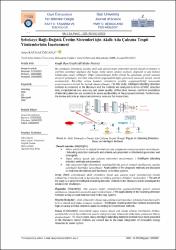Şebekeye Bağlı Dağıtık Üretim Sistemleri için Akıllı Ada Çalışma Tespit Yöntemlerinin İncelenmesi
Künye
ÖZCANLI, Asiye Kaymaz. "Şebekeye Bağlı Dağıtık Üretim Sistemleri için Akıllı Ada Çalışma Tespit Yöntemlerinin İncelenmesi". Gazi Üniversitesi Fen Bilimleri Dergisi Part C: Tasarım ve Teknoloji, 11.3 (2023): 592-612.Özet
Mikro şebekeler fotovoltaik, rüzgâr ve hidrolik gibi enerji kaynaklarının şebekeye entegrasyonunu sağlayan ve şebekeye bağlı ve şebekeden bağımsız çalışabilen, geleceğin enerji sisteminin önemli bir parçasını oluşturmaktadır. Mikro şebeke konsepti; fosil yakıt kullanımı, hat kayıpları, karbon ayak izi, emisyon azaltma ve enerji verimliliğini arttırma hedefi ile geleceğin akıllı şebekeleri için büyük bir potansiyele sahiptir. Bununla birlikte dağıtık üretimin güç sistemine entegrasyonu, güç sisteminin kontrolü işletilmesi ve korunmasında bazı dezavantajlara ve risklere neden olabilmektedir. Bu konudaki en büyük problemlerden biri, şebekeye bağlı çalışan mikro şebekenin herhangi bir arıza durumunda ana şebekeden ayrılarak çalışmaya devam ettiği istenmeyen ada çalışma durumudur. İstenmeyen ada çalışma durumu, güç sisteminde frekans kararsızlığına neden olarak, personel güvenliği ve güç sistemindeki ekipmanları için tehdit unsuru oluşturabilir. Bu durumu önlemek amacıyla ada çalışmanın ivedilikle tespit edilerek ana şebeke ile mikro şebekenin bağlantısı fiziksel olarak kesilmelidir. Literatürde birçok ada çalışma tespit yöntemi önerilmiştir. Bu çalışmada, literatürde sunulan akıllı ada çalışma tespit yöntemleri detaylı olarak incelenmiş ve önerilen yöntemler algılama dışı bölge, tespit süresi, işletme maliyeti, doğruluk ve güç kalitesi bakımından analiz edilmiştir. Diğer çalışmalardan farklı olarak bu çalışmada, gerçek zamanlı deneysel çalışmalar, önerilen yöntemlerin uygulanabilirliğini göstermek amacıyla detaylı olarak incelenmiştir. Böylelikle ortaya konulan yöntemlerin pratikte uygulanabilirliği konusunda araştırmacılara önemli bir kaynak oluşturulmuştur. Microgrid is an important part of the modern power system, which integrates renewable energy sources such as photovoltaic, wind and hydro into the grid and can operate both grid connected and stand-alone mode. Microgrid concept has great potential for smart grid with the aim of fossil fuel use, line losses, decarbonization, and increasing energy efficiency. However, the integration of distributed generation into the power system may cause some disadvantages and risks in the operation, control and protection of the power system. One of the most important problems is the unintentional islanding situation, in which the micro grid operates by disconnecting from the main grid in case of any failure. Unintentional islanding can cause instability frequency in the power system and threat to personnel safety and equipment. To overcome this situation, islanding must be detected immediately and microgrids must be electrically separated from the main utility network. There are many islanding detection methods in the literature. In this work, intelligent islanding detection methods are presented in a comprehensive review and the proposed methods are extensively analyzed in terms of non-detection zone, detection time, applicability in multi-DG systems, accuracy, and power quality. Unlike other studies, real-time experimental studies are examined to demonstrate the applicability of the proposed methods. Hence, the review will be a vital guideline for researchers and field engineering.
Kaynak
Gazi Üniversitesi Fen Bilimleri Dergisi Part C: Tasarım ve TeknolojiCilt
11Sayı
3Bağlantı
https://dergipark.org.tr/tr/pub/gujsc/issue/80023/1195562https://hdl.handle.net/11352/4915



















